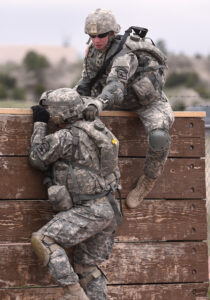By Rose O. Sherman, EdD, RN, NEA-BC, FAAN
Just before the start of nurse’s week, the Surgeon General issued an advisory on the epidemic of loneliness and isolation in the United States today. Now some of you may think that this advisory does not extend to happen within work settings, but you would be wrong. Loneliness can happen in any setting, including work, if staff members don’t feel a social connection, but the data suggests otherwise. Christine Porath, a researcher, found that 65% of employees today feel no sense of community at work, and 40% feel lonely and emotionally isolated. The Surgeon General now recommends that leaders make building strong social connections an organizational strategic priority.
Gallup data shows that having a best friend at work impacts staff engagement and intent to leave. It is much easier to leave an organization where you feel no connection. The US Army established a program called Battle Buddies to combat these feelings of isolation. Battle buddies help each other through difficult situations and stop soldiers from self-isolating when things become challenging. It has been mission-critical for the army to build teamwork among the troops and help young soldiers get through Bootcamp and their initial military experience. Some have described it as a “forced best friend at work.” The Battle Buddy program has increased engagement, improved morale, and decreased soldier suicide.
I have been surprised at the number of former military nurses who have commented during workshops about what a crucial difference their battle buddy made for them. Most stay in contact for the rest of their lives. Dr. Noreen Brennan took this concept and was the first to pilot a Battle Buddy Program at NYC Health and Hospitals. The idea has proven especially crucial for new graduates. The current turnover of nurses in their first two years of practice is over 50%. At least some part of this turnover is likely related to not feeling social connections at work.
The initiation of a Battle Buddy program acknowledges that what novice nurses are experiencing in their work is challenging. Many senior leaders have described the current turbulence in healthcare as similar to the chaos and stress one might see in a battle. Battle buddies ideally work on the same unit and would be scheduled together when possible (the army even encourages soldiers to sign up with their friends and go through boot camp together – something to think about with new graduates). They would be given time, taught coaching skills, and encouraged to do the following:
- Learn about one another’s lives and personal interests.
- Discuss ways to maintain a healthier lifestyle and be an accountability partner.
- Establish ways to connect to communicate.
- Choose a social activity that they do together.
- Have crucial conversations with one another when things are not going well.
Every new idea is worth considering, so why not consider a Battle Buddy program for your organization as you transition this year’s class of new graduates? It is an idea that costs very little but could have a big payback for both organizations and new nurses.
© emergingrnleader.com 2023
Rebuilding Your Nursing Team in 2023: Coming Together after Falling Apart – Click Here for the Flyer
Now Available at Amazon and all Major Book Sellers

Other Programs/Books Your Leaders May Find Valuable
From Traditional Nurse Leader to Nurse Leader Coach – Click Here for the Flyer
For new leaders and emerging leaders, consider doing The Nuts and Bolts of Nursing Leadership Program – Click Here for the Nuts and Bolts Flyer Final
New Leader Development Option in 2023 – Team Coaching Designed to the Unique Needs of Your Organization Leader Coaching Brochure
Read the Nurse Leader Coach – Available at Amazon and Other Book Sellers
Recommended Book by the Association of Critical Care Nurses – The Nuts and Bolts of Nursing Leadership: Your Toolkit for Success



 LinkedIn
LinkedIn Instagram
Instagram